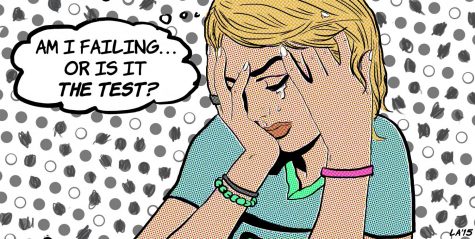Standardized Tests Are an Unnecessary Burden on Students
What is the definition of standardized tests? A standardized test is any form of test that A, requires all test takers to answer the same questions, or a selection of questions from a common bank of questions, in the same way; and B, is scored in a “standard” or consistent manner, which makes it possible to compare the relative performance of individual students or groups of students.
Standardized tests do nothing for children except for pit them against each other. For some students, it can make them physically sick where they are getting headaches and stomach aches. The only thing that standardized tests measure is how good you are at taking tests. If one student has all A’s but isn’t a good test taker and doesn’t pass, it doesn’t mean that they don’t know the material, it just means they maybe aren’t the best test-takers. On the other side of that, a student who doesn’t really know the material could take the test and get a 600 just because they are a good test-taker. This isn’t everyone, but it’s mainly to point out that some people are good test-takers while others are not.
This year has been crazy with everything going on. COVID-19 has completely changed how we do things like school. Most kids are only going to school two days a week and do the rest of their schooling online. For most students, it’s harder to learn when we are online. Some students are completely online and they aren’t even going to school. With everything going on right now, and most student’s stress levels being high, why should we be forced to take SOLS?
Then there are the psychologically troubling effects of taking a test. Many students are already traumatized by the pandemic. Many children, confronted with these tests, will still be in the midst of staggering experiences related to illness and economic hardship. Many of these same children have prior testing experiences of anxiety, frustration, boredom, or even shame, when, for example, their low scores were posted on data walls.
At this time of national trauma, we should not forget that tests have a long history of being the cause of inequity rather than a resource for educational opportunity. For decades, tests, first IQ tests, and then achievement tests, have been used to sort English-language learners into low-track classes where learning opportunities and outcomes have been worse than in regular classrooms. The negative effects for children from low-income households have been shown for grade retention.
The origins of standardized tests started between 1840 and 1875. Education evolved into more formal and standardized practices and teachers replaced oral testing with written examinations. From 1875 through the end of World War I, standardized tests were developed to determine student preparation for college. The SAT is an example of one such test.
Individual states began testing large numbers of children and teenagers through the public school systems in the 1970s. By the 1980s, American schools were assessing nationally. In 2012, 45 states paid an average of $27 per student, and $669 million overall, on large-scale annual academic tests. However, other costs, such as paying teachers to prepare students for the tests and for class time spent administering the tests, significantly exceeds the cost of the test itself.
The way SOL tests work is you can get a score of 1 through 600. There is a set list of things a teacher has to teach for each class subject. For example, a 3rd-grade math teacher has to teach short division and multiplication for the SOL. Then, they put questions about multiplication and short division on the SOL or standardized test. But they also put more advanced questions, and if you get the questions about division right then they will give you more challenging questions. On the flip side, if you get those questions wrong, then they will give you similar questions to the ones you got wrong.
There have been many studies on why standardized tests aren’t good for students. Distinguished developmental psychologist Samuel Meisels believes that most young children have a restricted ability to comprehend the formal, spoken instructions required for most standardized assessments, they fail to pick up the cues that older children use to determine what is expected of them in an assessment environment. Younger children also lack the sophistication to interpret situational cues or written instructions.
Most times if students don’t pass these types of tests then their self-worth goes down. They might start to feel angry at themselves for not getting a better score or getting the wrong answer. They might start to think of themselves as failures instead of just being a bad test-taker. Most students take failing tests personally. It can cause an increase in things like anxiety, which can often lead to things like drug and alcohol use.

Similarly, questions that require complex information-processing skills and responding correctly to multistep directions, may easily cause a child to give the wrong answer to a question.
Standardized tests create lots of stress. Most students try their best to pass and feel the pressure of being tested. Test scores can affect student confidence. This can lead to students developing a negative attitude about their abilities and a dislike for school.
Teachers MAY end up teaching to the test, rather than giving students a deeper understanding of the subject. However, this can create a classroom atmosphere that lacks creativity and can limit a student’s learning potential.
Standardized tests evaluate a student’s performance without considering external factors. Standardized tests don’t consider factors like test anxiety, home life, or the fact that some kids are extremely bright but just don’t test well. They also only consider a single test performance upon evaluation. It does not consider how much a student has grown over the course of the year. This can be an annoyance to teachers who worked to help their students grow, and students who put in their best effort to improve but performed poorly on one test.
Almost all standardized tests create a limited scope of learning and success. Standardized tests only measure specific areas like reading, writing, and math. They don’t provide a full picture of the skills needed to learn, such as creativity, motivation, and cooperation.
Summary scores from multiple-choice questions covering an entire year’s worth of content do not help teachers know what specific skills students have mastered nor what they are next ready to learn. Because they may not be connected to the curriculum.
Overall, SOLS and standardized tests only cause stress and in some cases physical sickness. They can also cause a negative attitude towards school and low self-esteem. Standardized tests only increase anxiety and cause self-doubt. Right now, with everything going on, are we really going to make students take a test that only really tells them whether they are a good test taker or not? Are we really going to increase stress levels more than we have to? Are we really going to cause sickness and anxiety to spread like a disease? Even when this is all over, are we really going to put all that pressure and so much more onto our students? If we continue to force SOLS and standardized tests. then the answer is yes. So ask yourself, do you really want that for our students?

Hello! My name is Kayla Moyer and I am a junior. I have been at liberty High School for 2 years and I love the environment it provides. I have previously...







Blaire Odom • Apr 16, 2021 at 2:00 pm
This has great information on how the standardized test is not much of a great system. Anyway, this is a good article.
Reagan Coppage • Apr 15, 2021 at 11:40 am
I really agree with everything you said in this article. Honestly SOLs are just something that makes me more nervous than like projects or anything. I am not a very good test taker and they make it difficult for kids who are not good test takers. They really need to consider doing projects or something like that.
Mason LaChance • Apr 6, 2021 at 8:22 am
I understand the points our making and think it’s a great concept however I disagree. One of the points of standardized tests is to test how well that student handles pressure. Going to college, or even the next grade, brings more stress onto your life and they need to know you can handle it. The point about an all-A student just being a bad test taker isn’t possible because most classes have large tests that affect your grade. If these straight-A students can get an A on those tests, like midterms, then they should be fine taking a standardized test.
karlee salinas • Mar 11, 2021 at 8:03 am
I completely agree this year there should be no standardized testing. In other states, they have already gotten rid of them. Also, this type of test can make people feel like they aren’t smart due to scores. I really enjyoed reading this article. It was really well written.
Christian • Jan 11, 2021 at 12:18 pm
I could not agree more. I think standardized tests should be pardoned for this schoolyear, without question. Standardized tests are so miserable for so many people. I have no idea why Virginia hasn’t completely done away with them. If you look at other states, for example, Nevada, they only have THREE standardized tests from K-12 (not including the SAT/ACT).